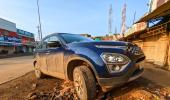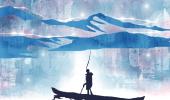Mary Raja, Arjun and Leo Panday, 11, have a taken a year off their regular work-school routines in Paris -- she works in the banking sector and he is a software engineer -- to travel around the world.
Their year began last September in the US, near San Francisco, and they criss-crossed the country, racking up 5,654 km.
Meanwhile, Leo is schooling from far, following the syllabus of France's National Centre for Distance Education on an iPad, whenever there is a break in the long bus rides, boat voyages or flights.
From America the Pandays aka The Travelling Family, as they call themselves, wended their way through Mexico, Central America and Colombia to Ecuador, sampling exciting new cultures, majestic scenery and remote places along the way, filing away the most treasurable memories.
Ecuador afforded them The Experience Of A Lifetime -- a few days living in the real heart of the Amazon in Yasuni National Park.
The Pandays have been recording their journey via a blog. Both Arjun and Mary have written about their memorable Ecuador jungle adventure, and the three days that were for them like none other, spent in one of the most special places on earth.
Read on for Mary Panday's account.

After we heard about the political unrest in Peru and stories of tourists stuck in Macchu Picchu, our initial plans to go there from Colombia fell apart.
In Guatape, Colombia, we met a British tourist who talked about this amazing tour in Ecuador. We saw pictures of him next to a six or seven metre Anaconda digesting a deer it had eaten! I was immediately sold on the idea. So we decided to put Peru on the back burner and go to Ecuador.
This was to be our second time in the Amazon rainforest. We had been to Iquitos, Peru, many years back but hadn't spent much time with the local community. I realised that we were going to be in the Yasuni National Park, near the Napo river which flows right up to Iquitos!
Once in Ecuador, we got our bus tickets, sim card, some snacks and hopped onto the bus. I stepped down to get some peanuts and was paying the vendor when I heard Arjun yell my name. The drivers in Ecuador are sticklers for time and I could see the bus move with Arjun literally hanging out of it.
I ran as fast as I could and I luckily made it! I almost slipped and fell on my seat as the buses in Ecuador have slippery Formica flooring.
After two excruciatingly-long bus rides from Tulcan east to Lago Agrio we reached El Coca by 11 in the night. The way to El Coca was through mountainous roads and was breathtaking! Strangely enough there were no toilet breaks.
I was so grateful when one of our fellow travellers requested the driver to stop and we went out in the wild to relieve ourselves.
We met Wareka and his team (they belonged to the Waorani tribe) the next morning. He also came with an English translator as our Spanish is rather weak. In the evening, we went out for a drink to break the ice and get to know each other.
One of the team members came with his wife and child. To Leo's utter surprise and confusion, the little kid was served a little bit of beer.
The next morning we left at six in the morning for our expedition. It took us two hours from Coca to get to the river.

Along the way there were several oil extraction platforms. The Yasuní National Park, a 3,800 square mile swathe of forest, holds more than 1 billion barrels of oil, and is also home to one of the most diverse collections of plants and animals on the planet!
Chevron had been accused of polluting the Amazon rivers and poisoning waters used by local communities for over 26 years (Crude is an American documentary on the subject). They were fined a sum of $18 billion which was eventually reduced to $9.5 billion.
Chevron apparently never paid a cent and in fact the lawyer -- Steve Donziger, who fought on behalf of the indigenous tribes, was debarred from practicing law in New York in 2018, and was told to serve a six-month prison sentence in 2021!

We were asked to keep an eye out for anacondas by Pajarito (Spanish for parrot because of his ability to make different bird sounds) our translator.
We were also warned about the Taga tribe, who've chosen not to be in contact with the outside world. Any attempt to go close to their area is met with violence. Someone from the Waorani tribe was killed as recently as 2014.

So throughout the 10-hour boat ride we were alert, while all the others took a nap, except for Yatey and Raoul who were riding the boat.

We took two breaks along the riverside to meet one of Wareka's three wives and to pick up/drop off people. When we reached the village it was night. We were shown our rooms which were in a wood cabin.
We could hear bats and we saw some cockroaches. We were really glad that there weren't too many mosquitoes around.

The boat ride tired us thoroughly, but Yatey, Raoul and Wareka got busy in the kitchen to cook us a meal. As we walked around with torchlights, we noticed a small pond and someone casually mentioned that there are often snakes in that one.
Noticing my discomfort they quickly added that they weren't poisonous, just water snakes.

In the dining area, a monkey kept coming towards us. It was the village pet monkey which they playfully call Mono Loco (crazy monkey in Spanish). After the meal, Wareka asked us if we wanted to go look for alligators and other reptiles.
By this time we were too tired to venture out so we went to bed with the bats, the roaches and other insects.
- PART 2: An Indian Amazon Adventure











 © 2025
© 2025